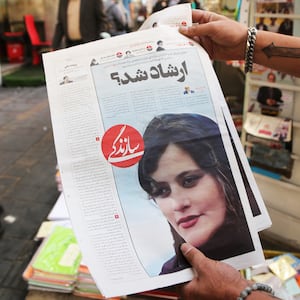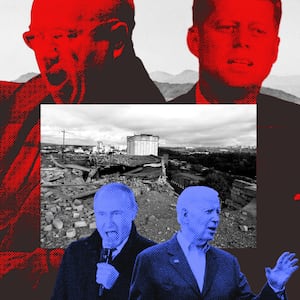Ordinary Iranians have been putting their lives on the line to oppose theocracy and gender apartheid.
After the apparent murder of a Kurdish woman by the “guidance patrol” (Iran’s religious police force), weeks of protests have been met with “bullets, metal pellets, gruesome beatings, killings, abductions, and disappearances.”
Anyone who cares about basic human rights should sympathize with the brave women and men standing up against the regime in Iran. But expressions of sympathy can ring hollow. Sympathy doesn’t buy groceries for Iranians who’ve lost their jobs for protesting the regime, and it certainly doesn’t stop bullets or bust political prisoners out of their cells.
ADVERTISEMENT
So—should “we” (i.e. the United States government) do something?
The question is inevitably asked when a crisis involving human rights violations breaks out in a distant part of the world—or at least it does if it happens in a nation we’re used to thinking of as an enemy. And in mainstream political discourse, “do something” nearly always means “bomb someone,” “sanction someone” or “send troops.”
These are the blunt instruments of our imperial foreign policy and, as citizens of a country that maintains hundreds of military bases all around the globe, it can be hard to break out of thinking this way.
But in this case, there’s one easy and obvious thing the U.S. can do to help Iranians struggling against their contemptible regime—and it’s exactly the opposite of “doing something” in the usual sense.
We should lift the sanctions on the Iranian government that keep ordinary Iranians on the edge of misery, limit their access to the world, and make it harder for them to take risks to oppose the regime.
Helping Iranians Without Playing “World Police”
I understand, the suggestion might seem ridiculous.
If you think of the U.S. as the world’s police officer, and less powerful nations as the criminals we keep in check by patrolling the streets, then suggesting that we leave Iran alone just as it openly commits grave crimes seems exactly backwards. If you think this way, we should be coming up with new ways to collectively punish that nation. But we very badly need to stop thinking that way.
It's a mindset that’s led Americans to support catastrophic wars in recent decades. When then-President George W. Bush sent troops to invade Iran’s neighbor, Iraq, we were told those troops would be greeted as liberators. They were greeted with many years of insurgency, chaos, and resentment as more and more working-class Americans came home in flag-draped coffins.
In another of Iran’s neighbors, Afghanistan, the U.S. toppled a theocratic regime even more loathsome than the one in Tehran—and spectacularly failed to build a new state with enough popular support to survive even long enough for American troops to make it to the airport 20 years later.
Does anyone anywhere believe that if Joe Biden dispatched the 82nd Airborne to bring democracy to Iran, the results would be any better?
Neither Iraq nor Afghanistan had anything like Iran’s military capacity. The Islamic Republic has enough weapons of war to spare that Vladimir Putin has been killing Ukrainians with Iranian drones—a horror that, by the way, could likely be stopped if the U.S. was prepared to lift the sanctions on Iran and normalized relations. In such a scenario, Iran would have something to lose from giving this aid—but as things currently stand, they don’t.
A war with Iran would make Iraq and Afghanistan look like minor skirmishes.
That is, presumably, why so few people can bring themselves to seriously advocate such a thing.
So what does that leave if you think “doing something” means taking aggressive action? Should we lob a few cruise missiles? Iran’s reaction to then-President Donald Trump’s ordering the assassination of one of its senior military commanders, Qasem Soleimani, leaves little doubt that the Islamic Republic wouldn’t take such action lying down—they would fight back, and it would probably lead to a wider war that would be disastrous for the U.S. and, of course, be a massive boon to the regime’s domestic popularity.
Impose sweeping sanctions? We’ve already done that, too. It’s part of the problem.
How Sanctions Help Iran’s Elite—And Hurt Ordinary Iranians
Iran was given some sanctions relief in 2015 as part of the nuclear deal negotiated by then-President Barack Obama. But when Trump followed the advice of neoconservatives and backed out of that deal, that relief went away.
And, of course, Iran didn’t continue to honor its half of the bargain. Why would they? If you think the world is a safer place without an Iranian nuclear arsenal, that’s yet another reason for the U.S. to offer to lift the sanctions.
Those sanctions limit many Iranians’ access to not just the world economy, but the internet as well. They make it extremely difficult for wealth to be amassed by anyone outside of the regime-connected elite.
When I asked Kurdish academic and podcaster Djene Bajalan about this, he pointed out that smuggling and sanctions-busting are rampant—but that high officials, their friends, people who run regime-connected “religious endowments,” and so on are obviously best-positioned to get away with this activity and profit from it. And such people don’t have to send their children to schools where they live in fear of the guidance patrol. Iran’s class of aghazadeh (children of the elite, or literally “children of the lords”) are often sent to school in countries like Canada.
Meanwhile, the Iranians filling the streets chanting “Women, Life, Freedom” have to worry about how they’ll feed their families. The UN’s special rapporteur on the effects of the sanctions has spoken of their “devastating humanitarian impact.”
Anyone who’s ever tried to do so much as organize a union at their workplace—never mind a mass uprising in a nation—knows that people who have to worry about the basic needs of their loved ones will understandably hesitate to take personal risks for causes they might be sympathetic to in the abstract. If Iran’s vile regime survives what’s happening right now, a major reason will be economic desperation forcing people back to life-as-usual.
If you want the emotional satisfaction of punishing someone and fulfilling the world’s-policeman fantasy, you’ll have to turn elsewhere for solutions. But if you want to actually help the women and men putting their lives on the line in Iran’s streets right now, lift the sanctions.









